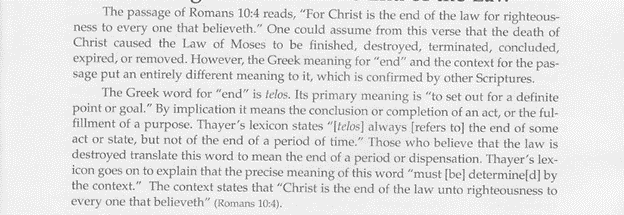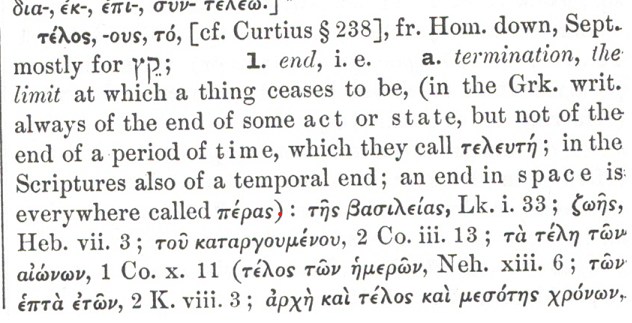Misquotations There are multiple anecdotal or unsupported quotations. A Google search on “We take the Bible away from children when they enter school and give it back to them when they enter prison” (Institute in Basic Life Principles, 1999, p. 3) yielded no conclusive results on its origin. Also, “morally flat” (Ibid., p.3) and “realm of the amoral” (Ibid., p.3) are in quotations but no citation is given for them. It would be easy to dismiss such slovenly writing and editing as the best that a not-for-profit organization can do. But, if a college freshman can be expected to cite sources in a specific manner, and be penalized for not citing sources correctly, surely an organization with multiple millions of dollars in real estate holdings can figure it out. By far, my favorite example of deception used to construct this false teaching in this document is that IBLP misconstrues Charles Ryrie’s argument in his essay, “The End of the Law” found in Vital New Testament Issues edited by Zuck (1996). If a college freshman can be expected to cite sources in a specific manner, and be penalized for not citing sources correctly, surely an organization with multiple millions of dollars in real estate holdings can figure it out. The issue with Gothard’s use of this edited quotation is that first, he didn’t quote the entire passage. The entire passage reads as follows with the edited portion highlighted: “All interpreters of Scripture are faced with the clear teaching that the death of Christ brought an end to the Mosaic Law (Romans 10:4) while at the same time recognizing that some of the commandments of that Law are restated clearly and without change in the New Testament epistles.” (Zuck, 1996, p. 79) Rather than making a blanket statement that the law is completely over and done with as Gothard would want us to believe that Ryrie writes, Ryrie is describing the conundrum that Bible interpreters run into. That conundrum is that the Christ has brought an end to the law in one sense, but there are also standards for Christian living given in the New Testament that sound a lot like the law. Contrary to IBLP’s claim, the other quotation from Ryrie’s essay is not at the end of the essay, but a setup for the tension of the law being completed and done away with in Christ but the New Testament also having moral commands. We’ve already explored in Part 1 on this section of the document on the use of Scripture. IBLP quotes Thayer’s Lexicon as a proof that the Greek word telos does not have a time category associated with it. However, they fail to accurately quote Thayer’s entire entry in the Lexicon, and seemingly, create an entirely new definition of telos not even based on Thayer’s. IBLP’s definition of telos is, “to set out for a definite point or goal.” Thayer’s definition is as follows:
But the most disturbing thing about IBLP misquoting Thayer’s is their willingness to create an entire doctrine of the unchanging nature of the application of the Old Testament law around half a lexical entry. The entire sentence reads thus: IBLP insists on a definition from a lexicon and then proceeds to create its own definition not found in that same lexicon. There are plenty of passages in Scripture where telos has a temporal (time) aspect to it. Something that was, came to an end, and therefore it ceased to exist in the same way as before. Logical Fallacy Gothard is claiming not just the moral law, but also the civil and ceremonial law should be in force. From about the 13th century to the present, there has generally been an understanding within theology that the civil and ceremonial portions of the law are either fulfilled in Christ or will be implemented perfectly in the millennium as part of the consummation. I don’t personally hold the moral, civil, and ceremonial division of the law. I believe that something deeper is going on with Christ fulfilling the law on our behalf and if we’re in him, we have already fulfilled the righteous requirement of the law. Charles Ryrie argues ably that the law is and always has been a unit and was done away with in Christ, but that we in the church today have a higher calling upon our lives, that is, to love God and love our neighbor. What Gothard butchers in his inadequate quotation of Ryrie goes a long way to show how deceitful Gothard is and how Ryrie has the correct perspective on the law as it applies to the New Testament believer. Charles Ryrie argues ably that the law is and always has been a unit and was done away with in Christ, but that we in the church today have a higher calling upon our lives, that is, to love God and love our neighbor. This is a logical non sequitur (it does not follow). It’s one thing to argue that the civil and ceremonial laws are done away with in Christ, but the moral still applies today. There are plenty of orthodox, evangelical theologians who hold to that position. What’s outside the bounds of orthodoxy is insisting on a three-fold division of the law while also insisting that the civil and ceremonial portions still apply. To that, I would reply: “I see that you insist on the ceremonial laws of say, after childbirth since they’re ‘confirmed’ by medical science—what ‘science’ that is doesn’t matter enough to cite it apparently—but there’s also a bunch of animal killing that you’re not insisting on that’s tied to those same laws. Who are you, then, to relax that part of the law while insisting that the other part still applies? Also, I notice that you cut the corners of your beard and don’t wear tassels on your cheap navy suits.” Seems like there’s a lot of law Gothard likes to ignore, but whenever he has “insights” like he’s another Messiah, that’s what applies to all Christians today in his mind. Conclusion If I view the law, the Bible, etc., as ultimately about me, then I’ve replaced the God of the Bible with a god of my own creation. And he looks a lot like me. Misusing God’s word for my own personal “success” as Gothard and Co. are fond of preaching, will only end very badly on judgment day. This is a false gospel (if you just obey, you will get what you want!) with a false canon (Basic and Advanced Seminars, Advanced Training Institute, Wisdom Booklets, counseling training) all lead by a false messiah (Gothard himself). There’s only one person who is above reproach in the IBLP universe, and it's Gothard. Ironically, whatever hit the fan in 2014 that led to Gothard being fired by his own board of yes-men, IBLP is still peddling Gothard’s wares and teaching what he taught. Gothardism is a different religion, as opposed to the Christianity it mimics and mocks at the same time. I already have a Messiah; his name is Jesus. Hebrews 8:6-7 But as it is, Christ has obtained a ministry that is as much more excellent than the old as the covenant he mediates is better, since it is enacted on better promises. For if that first covenant had been faultless, there would have been no occasion to look for a second. (ESV) May God see and judge. Bibliography Institute in Basic Life Principles. (1999). Discerning God’s Will in Every Decision. Institute in Basic Life Principles Oak Brook, IL.
Thayer, J. (1995). Thayer’s Greek-English Lexicon of the New Testament: Coded with Strong’s Concordance Numbers (Reissue,Subsequent ed.). Hendrickson Academic. Zuck, R. B. (1996a). Vital New Testament Issues (Vital Issues Series, Vol 8). Kregel Academic & Professional. Scripture quotations marked (ESV) are from The Holy Bible, English Standard Version(R) (ESV(R)), copyright (C) 2001 by Crossway Bibles, a publishing ministry of Good News Publishers. Used by permission. All rights reserved. Comments are closed.
|
Andrew
Trouble-making Zealot Archives
September 2024
Categories
All
|



 RSS Feed
RSS Feed